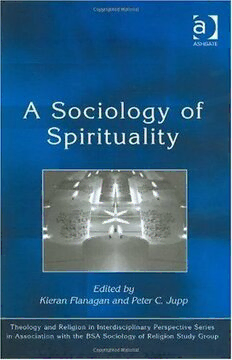
A Sociology of Spirituality PDF
286 Pages·2007·0.689 MB·English
Most books are stored in the elastic cloud where traffic is expensive. For this reason, we have a limit on daily download.
Preview A Sociology of Spirituality
Description:
The emergence of spirituality in contemporary culture in holistic forms suggests that organised religions have failed. This thesis is explored and disputed in this book in ways that mark important critical divisions. This is the first collection of essays to assess the significance of spirituality in the sociology of religion. The authors explore the relationship of spirituality to the visual, individualism, gender, identity politics, education and cultural capital. The relationship between secularisation and spirituality is examined and consideration is given to the significance of Simmel in relation to a sociology of spirituality. Problems of defining spirituality debated, with considerations of its expression in the U.K., the U.S.A., France and Holland. This timely, original and well structured volume provides undergraduates, postgraduates and researchers with a scholarly appraisal of a phenomenon that can only increase in sociological significance.
See more
The list of books you might like
Most books are stored in the elastic cloud where traffic is expensive. For this reason, we have a limit on daily download.
